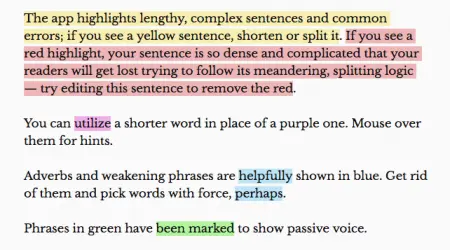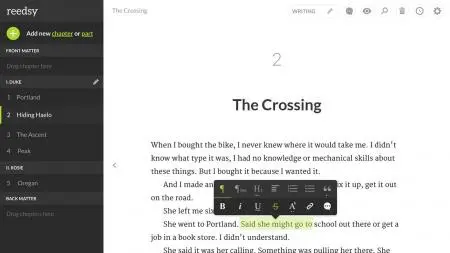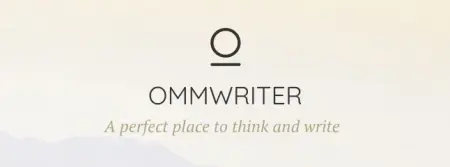Header via Unsplash
These days, it’s easier than ever to self-publish a book. The ability to do so is literally at the fingertips of anyone with a computer and internet connection. That being said, building a career as a self-published author takes a lot more than just writing a book and uploading it to Amazon. There’s a lot of work that goes into getting readers to connect with — and buy! — your book. To help all those aspiring indie authors out there, here’s a list of some of my favorite tools for navigating the world of publishing and here's a list of the best self-publishing companies aroud.
Writing communities
If you’re planning to build a career as a self-published author, you will inevitably need to assemble a team you can trust — whether that’s friends and family you ask to look over your manuscripts, or publishing professionals you hire for services like cover design or developmental editing.
That being said, you’ll also spend a lot of time writing — and writing tends to be a solitary enterprise. And yes, the image of the lone writer can be romantic: we imagine them clacking away at an old-fashioned typewriter, with made-up worlds and characters sweeping them off in a creative frenzy. But the truth is more likely to involve bleary, screen-tired eyes, and a pet that watches on, wondering why you keep talking to them and when you’re going to leave the house. In other words, being an author can get lonely. It can also be hard to stay motivated and accountable when you’re working on a solo project.
Enter: writing communities. Writing communities can serve so many different purposes: they can help you find critique circles and beta readers who are willing to spruce up your writing. But they can also connect you with like-minded authors who can understand and relate to the writerly experiences and struggles you’re going through.
Here are a few communities we suggest you check out:
Critique Circle
Every writer needs to know how to ask for feedback, and how to accept feedback. Publishing a book that hasn’t been reviewed by others is a colossal no-no in the world of publishing — whether indie or traditional. Critique Circle is a members-only site that allows authors to receive feedback on their writing in exchange for providing feedback to other authors. It’s a well-respected and longstanding site — since opening in 2003, it’s offered more than 700,000 critiques for over 140,000 stories.
Insecure Writer’s Support Group
Another side effect of doing solitary creative work: there’s a lot of room for negative thoughts to creep in. Writing a book is a big undertaking, and any author who manages to totally stave off self-doubt and insecurity has iron willpower. Luckily, communities like Insecure Writer’s Support Group allow you to connect with authors going through the same challenges you are, so that you can offer and receive encouragement and get through the “bad writing days” with a helping hand.
CP Matchmaking
This site asks you to fill out a form about your book and then gets to work on matchmaking you with a beta reader. How straightforward is that? Though you may have already decided to join a critique circle, it’s a good idea to also consider working with a beta reader to ensure your book is as polished as it can be. While a beta reader goes over the whole book from the perspective of a reader, a critique partner can offer specific advice on the areas you may be struggling with, offering up suggestions, encouragement, and a more in-depth analysis of how the book gets put together.
Writing tools
We’ve come a long way from using clay and papyrus to tell stories. Still, even in the digital age, the various methods for writing a book continue to grow and develop. Here are some of my favorite writing tools.
Hemingway
This is more of a tool for editing your work and tightening your prose. Claiming to make your writing “bold and clear,” the Hemingway app will review your writing and offer suggestions by highlighting awkward sentence structure, qualifiers, passive voice, adverbs, and more.
So what kind of suggestions might the app offer to its own namesake? Below is an excerpt of the apps’ sample suggestions.

Reedsy Book Editor
When writing a novel, authors often forget about the more technical aspects of self-publishing — such as interior formatting and typesetting. Well, with the Reedsy Book Editor, it’s okay to forget about those things, since it formats your book into a professional-looking manuscript for you! You can choose to either write straight into the editor and let it format as you go, or you can copy and paste your work from any word processor and format it then. You can also spruce your manuscript up with fancy chapter breaks and choose whether you want to use the Reedsy, Classic, or Romance theme for your book. Better still: as soon as your book looks the way you want it, you can immediately export it into a format ready to be published as either a print or ebook.

Ommwriter
Okay, the first tool helps you edit your work, the second one formats it for you… this one is here to help you write, plain and simple. The bells and whistles are minimal, and the ones that are there — such as customizable keyboard noises, peaceful backgrounds, and soothing music — are meant to help you get into a focused mind space so that you can concentrate on the task at hand. While the full tool costs about $7, you can test out the web version for free.

Cover design tools
This part of the post is a little tricky to write, because I believe that indie authors should avoid designing their own book covers at all cost — unless they’re also skilled designers in their own right. All books are judged by their covers, and if you want to have a career as a self-published author, you should absolutely invest in hiring a professional cover designer to ensure your books are putting their best foot forward.
That being said, I know it’s not within every author’s budget to hire a professional, or else it's something they plan to do down the road. So if you are going to DIY your book cover, here are a couple of good tools to turn to.
Canva
Canva’s site looks modern, and, luckily, its contemporary vibe translates to its book cover templates as well. The problem with many homemade covers is that they end up looking, well, homemade — and often dated, too. But Canva manages to provide users with fresh, professional-looking templates, and even offers genre-specific templates. So if you’re designing a book cover for a thriller, you can search for thriller templates that generally match up with industry standards for that genre, no extra research needed.
Placeit
Placeit is similar to Canva in that it offers genre-specific book cover templates that authors can easily customize. It also offers a number of images, illustrations, and graphics that authors can use with the click of a button. What makes Placeit stand out is that it offers the option to download 3D mockups of your book cover, which can come in handy when you’re creating promotional images for your book.
Adobe Spark
With tools like Photoshop and InDesign, Adobe is obviously a powerhouse in the world of design. But its price tag and steep learning curve can be both wallet-draining and headache-inducing. This is why Adobe Spark is a very appealing option — it’s a cheaper, simpler design tool that comes from the same brilliant developers behind Adobe’s more complex tools.
"Writing for fun" tools
Something many of us learn the hard way is that when we try to turn our passions into a career… suddenly the thing we’re passionate about becomes a little less fun. So in between perfecting your manuscript, sourcing a book cover, and learning the ins and outs of publishing, it’s important to go back to basics once in a while and just write for ourselves! Otherwise you’ll find your creative batteries begin to drain very quickly. Whatever you write may find its way into a book at some point — but don’t sit down with that intention. Sit down with the intention of shaking off the responsibilities of writing as a career, and just write for fun.
Here’s a few tools for helping you do just that.
Twist Generator
Often, the most fun scenes to write are the big, splashy ones. The scenes that cause gasps as they send the story spinning off in a new and unexpected direction. The thing is, for plot twists to actually achieve that kind of reaction in a reader, authors need to put a lot of time and effort into setting the stage so the twist doesn’t feel too out of left field. This twist generator alleviates all the burden by offering up just the twist, allowing you to write something unhindered by the prospect of what must have come before So when you’re starting to feel lost in the exposition and buildup of whatever novel you’re working on, give this generator a whirl and give yourself a break by writing the most dramatic, sudden twists you can.
Writing Prompts
You know that feeling when you’re either driving, in the shower, or about to fall asleep and suddenly you’re struck by inspiration? Often, the best ideas come to us precisely when we’re busy thinking about other things — and when we’re not prepared to stop everything and write.
That’s the great thing about writing prompts. When you actually are ready for a productive writing session, you don’t have to try and remember those light bulb ideas or waste time coming up with new ones. As you scroll through this list of over 700 prompts for all different types of genres, you’re bound to find one that gets your pen moving. As with the twist generator, whatever prompt you choose to follow, go wild with it. Don’t worry about showing vs. telling or realistic dialogue. This is your time to play, so break all the rules while you’re at it.
Character Development Exercises
Alright, alright. Maybe you simply can’t bring yourself to spend free time just writing for fun. After all, spare time is preciously rare for many of us, so any we come by needs to be dedicated to furthering our writing projects.
A good way to bring some joy back into the process of writing while still making progress on your novel is to spend a session on character development exercises. These exercises allow you to chisel away at the surface of your character and to explore new sides of them, so when you come back to your novel, you’ll be able to get into the head of your characters more easily and confidently.
Some examples of character development exercises include creating a dating profile, writing a monologue in the voice of your character, or finding your character’s theme song.
Have you self-published your own book? What tools did you use along the way? Leave any tips we might have missed in the comments!

About the author
Emmanuel Nataf is a Founder at Reedsy, a marketplace and set of tools that allows authors and publishers to find top editorial, design and marketing talent. Over 3,000 books have been published using Reedsy's services.








